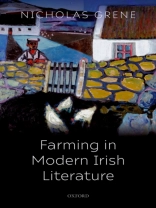This innovative study analyzes the range of representation of farming in Irish literature in the period since independence/partition in 1922, as Ireland moved from a largely agricultural to a developed urban society. In many different forms including poetry, drama, fiction, and autobiography, writers have made literary capital by looking back at their rural backgrounds, even where those may be a generation back. The first five chapters examine some of the key themes: the impact of inheritance on family in the patriarchal system where there could only be one male heir; the struggles for survival in the poorest regions of the West of Ireland; the uses of childhood farming memories whether idyllic or traumatic; and the representation of communities, challenging the homogeneous idealizing images of the Literary Revival; the impact of modernization on successive generations into the twenty-first century. The final three chapters are devoted to three major writers in whose work farming is central: Patrick Kavanagh, the small farmer who had to find an individual voice to express his own unique experience; John Mc Gahern in whose fiction the life of the farm is always posited as alternative to a rootless urban milieu; and Seamus Heaney who re-imagined his farming childhood in so many different modes throughout his career. Farming in Modern Irish Literature yields original insights into the literary iconography of rural Ireland and its interplay with social and cultural history, opening up fresh vistas on the achievements of Irish writers in different genres, styles, and historical eras.
Nicholas Grene
Farming in Modern Irish Literature [PDF ebook]
Farming in Modern Irish Literature [PDF ebook]
Beli ebook ini dan dapatkan 1 lagi PERCUMA!
Bahasa Inggeris ● Format PDF ● Halaman-halaman 224 ● ISBN 9780192605528 ● Penerbit OUP Oxford ● Diterbitkan 2021 ● Muat turun 3 kali ● Mata wang EUR ● ID 7899681 ● Salin perlindungan Adobe DRM
Memerlukan pembaca ebook yang mampu DRM












